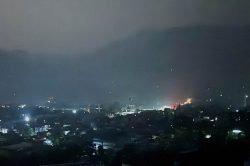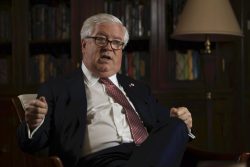
A protester wears a Donald Trump mask in a march to show support for Kilmar Abrego García, a Maryland man who was deported to El Salvador as a result of an “administrative error” and Miguel Luna, who perished in the Key Bridge collapse, on May 1.
15:00 JST, May 10, 2025
The United States and Britain announced a new trade deal on Thursday, which President Donald Trump touted as the first of many new bilateral deals with countries around the world. Trump officials claim the new pact with Britain would generate $5 billion in economic opportunities for U.S. exports, although the 10 percent minimum tariff that the United States applied to all countries remains in place. Whatever the White House’s grandiose framing, details on the deal are limited, and most economists maintain that it’ll do little to change the downward trajectory projected for the U.S. economy thanks to Trump’s protectionism.
Trump may have been better served spending his Thursday phone call with British Prime Minister Keir Starmer discussing a different matter altogether. In recent days, news has emerged of the Trump administration’s efforts to deport unwanted immigrants to third-party countries. According to The Washington Post, U.S. officials have engaged a string of countries on taking an untold number of migrants who are not their citizens. Some of those countries are already participating in such programs – including El Salvador, Mexico, Costa Rica and Panama. Other mooted destinations are more curious: Libya, Ukraine and Rwanda.
Britain, of course, has experience with sending would-be migrants to Rwanda. Between 2022 and 2024, its Conservative government invested political capital and taxpayer funds in a project to send asylum seekers desiring a life in Britain thousands of miles away to the small central African nation. The Tories went ahead with it even after Britain’s Supreme Court ruled that the plan was unlawful in November 2023. But the policy never took off amid legal challenges, did little to deter migrants from attempting the perilous English Channel crossing on small boats from the European mainland and cost close to a billion dollars in public funds as Britain tried to smooth the way for the deportations.
Starmer’s Labour government formally ended the plan when it took power last year. “The Rwanda scheme was dead and buried before it started,” Starmer declared last July, days after the election that ended 14 consecutive years of Conservative rule. His home secretary, Yvette Cooper, described the project as the “most shocking waste of taxpayer money I have ever seen.”
The White House is bent on fulfilling Trump’s campaign pledges of carrying out mass deportations of undocumented migrants. According to documents reviewed by The Post, the administration was not deterred by the prospect of sending deportees to a war zone (as in the case of Ukraine), a country split in half by two warring factions (in the case of Libya), or into the clutches of a controversial, autocratic regime (as in the case of Rwanda).
“Dated January to May, [the documents] show that since taking office his administration has worked aggressively, and often out of public view, to increase the number of nations that will accept third-country nationals from the U.S., routinely dangling incentives or leveraging the prospect of improved relations with Washington in pursuing its objectives,” The Post reported earlier this week.
Ukraine has not taken any deportees under such a program from the United States. One third-party national, Iraqi citizen Omar Abdulsattar Ameen, was sent to Rwanda this month, after a protracted set of legal battles over his alleged links to the terrorist Islamic State. Amid reports of imminent deportations to Libya, a federal judge warned the Trump administration that it “cannot deport immigrants to Libya, Saudi Arabia and any other country where they are not citizens without due process, saying such a move would violate standing court orders intended to shield people from being expelled to countries where they could be harmed or killed,” my colleagues reported.
“This case presents a simple question: Before the United States forcibly sends someone to a country other than their country of origin, must that person be told where they are going and be given a chance to tell the United States that they might be killed if sent there?” U.S. District Judge Brian E. Murphy wrote in a preliminary injunction in mid-April. Trump adviser Stephen Miller, a vocal proponent for hard-line anti-immigration measures, decried the move as a “judicial coup.”
Trump has been evasive about these plans. When pressed by reporters about deportations to Libya at a briefing Wednesday, he claimed ignorance and directed further questions on the matter to the Department of Homeland Security. Human rights organizations have previously described Libya as a “hellscape of detention,” where would-be asylum seekers in search of passage to Europe end up victims of abuse, torture, rape and murder at the hands of criminal outfits and local militia.
Enter Rwanda, which is no stranger to migration diplomacy under long-ruling President Paul Kagame. In 2019, Rwanda agreed to host hundreds of African refugees marooned in Libya, as part of a plan brokered by the U.N.’s refugee agency and the African Union. Most are still awaiting resettlement. In 2013, Rwanda engaged in a deal with Israel to house Eritrean and Sudanese asylum seekers who had sought refuge in the Jewish state. The agreement was ruled unlawful by the Israeli Supreme Court five years later. Investigations into Rwanda’s handling of these migrants found that some were extorted and driven to neighboring Uganda, where they were compelled to join the illicit migration trail to the West.
During a Cabinet meeting Wednesday, Secretary of State Marco Rubio said the Trump administration was “actively searching” for nations willing to take citizens from third countries. “We are working with other countries to say, ‘We want to send you some of the most despicable human beings,’” he said, adding that it would be a “favor to us” and that the “further away from America, the better.”
Analysts argue that the Trump administration is giving cover to Kagame, whose government has backed a rebel faction in neighboring Democratic Republic of Congo that is implicated in atrocities, amid growing Western scrutiny into his rule. “This is merely a ploy to garner positive headlines and a cynical way in which to compel Western governments, like the U.S., to look the other way when inevitable human rights abuses are committed,” Jeffrey Smith, executive director of the pro-democracy nonprofit Vanguard Africa, told my colleague Adam Taylor.
"News Services" POPULAR ARTICLE
-

Social Media Helps Fuel Growing ‘Sex Tourism’ in Japan
-

BREAKING NEWS: Pope Francis Has Died, The Vatican Camerlengo, Announces (UPDATE 2)
-

India Says It Attacked Pakistan, Pakistani Kashmir
-

Japan’s Nikkei Stock Average Ends Higher; NTT Data Surges on Takeover Report (UPDATE 1)
-

US Treasury Secretary Says Trade War with China Is Not ‘Sustainable’
JN ACCESS RANKING
-

Core Inflation in Japan’s Capital Sharply Accelerates in April
-

U.S. Holds Fire Over Yen Exchange Rate Targets; Bessent Said to Understand Negative Impact on Markets
-

Rice Prices Rise for 15th Straight Week, with Releases of Stockpiled Rice Slow to Circulate
-

Social Media Helps Fuel Growing ‘Sex Tourism’ in Japan
-

Japan Must Take Lead in Maintaining Free Trade System, Says Chairman of Japan Trade Group
















